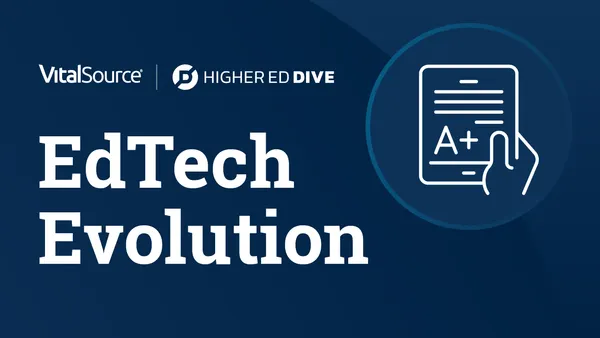Dive Brief:
- Udacity, an online education company offering short-term "nanodegrees" in technology fields, this week announced Gabriel Dalporto as its new CEO, following a spate of layoffs and restructuring. Co-founder Sebastian Thrun was leading the company after former CEO Vishal Makhijani stepped down in October.
- The former LendingTree executive was tapped "to lead Udacity into (its) next phase of growth," Thrun wrote in a blog post, which noted a recent shift to a subscription payment model and the expansion of its mentoring program have been positives for the eight-year-old company.
- Dalporto will step into an online education market in which students have an increasing number of options for courses and credentials at a range of price points.
Dive Insight:
Udacity has in recent months emerged from a period of considerable restructuring, layoffs and leadership change with an eye toward growth. The overhaul was prompted by slow returns on a period of rapid expansion, as new programs proved less popular than earlier offerings.
"I was hired to be a growth executive, not a turnaround executive," Dalporto told Education Dive in an email. "We do not have any plans or needs to reduce headcount. As a fast-growing startup that is incredibly ambitious, our company will continue to change and evolve over time as we adapt to the market and acceptance of our (programs) by students."
In May, Udacity shifted its payment model from fixed fees to a monthly subscription, which Thrun said was designed to offer more flexibility and reward students who completed courses more quickly. It also launched a global mentoring program. In his blog post, Thrun noted the company has been cash-flow positive since June and is "growing aggressively."
Dalporto said students have been completing courses 20% faster since implementing those changes.
However, some observers have pushed back on the pricing decision, arguing it makes their programs more expensive.
Meanwhile, Udacity has focused on its government and business partnerships, something Dalporto hopes to continue to expand. He also expects to pick up the pace of new program additions.
"Over the years, we've learned that every industry is hungry for tech talent — from health care to hospitality, ecommerce to education," Dalporto wrote. "We are determined to accelerate the rollout of our nanodegree programs to ensure that we are consistently teaching learners the most in-demand and cutting edge skills."
Udacity's shift comes as MOOC providers expand their program offerings and find new ways to improve retention and drive revenue.
Coursera, which works with colleges to offer online classes, is expanding its certificate and degree options. Earlier this year, it announced plans to partner with more than a dozen colleges and universities to launch a set of courses, specializations and master's degrees in health care topics. And it is working with Google to host an online certificate in information technology that is available for credit at several colleges.
EdX, another MOOC provider, has also expanded its degree offerings to 10 master's programs. It recently added a master's degree requiring students to participate in a short-course offered by another university through its platform in order to qualify for admissions.
This comes as online education providers widen their program offerings that range from single classes to full degrees and offer college partners more opportunities to integrate them into their curriculum.












